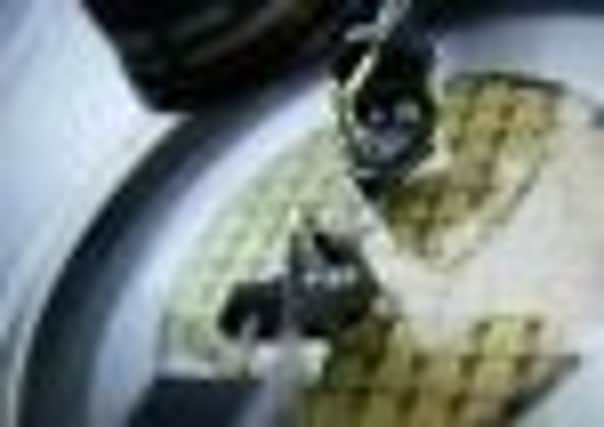Filtronic faces ‘challenges’ as it issues profit warning


The group, which was spun out of the University of Leeds in the 1970s, designs and makes technology to link and upgrade mobile phone base stations.
Yesterday Filtronic said it faces “a number of challenges” over the next 18 months. Customers are phasing out some of its older products sooner than anticipated; sales of other products are “tailing off more sharply than expected”, and a big customer has pushed back a £1m order into Filtronic’s next financial year.
Advertisement
Hide AdAdvertisement
Hide AdIn January, Filtronic also warned on sales and profits after its biggest point-to-point customer Nera Networks was bought by Israel’s Ceragon Networks, a rival maker of point-to-point systems, for $48.5m (£30.6m).
Shares in Filtronic shed 5.1p to close at 26.9p yesterday. They have more than halved since it revealed the impact of the Nera acquisition.
“We’ve taken a pessimistic view,” said chief executive Hemant Mardia. “There are certain things you cannot plan for, like one of your customers being taken over by a competitor. In the near term, there’s a profit impact that’s going to hit the business.
“Underlying this it’s still a positive business.”
Filtronic said it has axed jobs – “action has been taken to reduce costs in the point-to-point business where an appropriate headcount has been implemented”.
Advertisement
Hide AdAdvertisement
Hide AdIt is thought 15 jobs have been cut in Durham, leaving the group with around 140 staff.
Filtronic still has its registered office in Shipley but is largely based in Co Durham after the company moved production from Shipley to Durham to cut costs.
Filtronic said sales in its point-to-point business are expected to be around £12m this financial year ending in May, falling to £10m in 2012.
Last year Filtronic bought Isotek, a filter firm based in Leeds, for £10.7m in cash and shares. Yesterday Filtronic said this business has seen recent customer delays, which will reduce full-year Isotek sales to £4m.
Advertisement
Hide AdAdvertisement
Hide AdAnalyst George O’Connor at house brokers Panmure Gordon said the profit warning is “disappointing”, but given the Nera buyout and contagion from Japanese stock shortages it “may well have been anticipated”.
Panmure reduced its 2011 revenue forecast from £18.5m to £16.1m and underlying earnings from a £3m loss to a £5.3m loss.
“We expect that investors will remain nervous ahead of fuller disclosure at final results, and need to be reassured that Filtronic has its point-to-point business under control,” said the brokerage.
The group, formed in 1977 by University of Leeds Professor David Rhodes, was once a formidable force in the telecoms technology market but shrunk significantly in recent years by selling off businesses.
Advertisement
Hide AdAdvertisement
Hide AdDr Mardia said the company is still convinced Isotek was a good deal. The acquisition took Filtronic back to the heart of the base station market. Isotek’s unique filters allow mobile phone operators to rapidly upgrade existing networks cheaply, increasing use of existing spectrum.
“We paid a good amount of money for the technology,” he said. “Overall we have bought a good business but we have an issue over a customer-related delay. If you look at the numbers, we will do at least £4m of sales in Isotek and that’s from a standing start.”
Filtronic revealed Isotek has been selected by technology giant Alcatel-Lucent as a supplier for its AT&T and Sprint LTE programmes in the US.
In the long term, Filtronic believes its outlook is positive as surging use of data-hungry mobile devices such as smartphones and tablets will heap pressure on congested mobile networks and force operators to upgrade their equipment to add capacity – spending more on the group’s technology in the process.
Advertisement
Hide AdAdvertisement
Hide AdFiltronic has been developing a Gigabit radio, aided by Yorkshire Forward funding, which is designed to transmit five to 10 times more data than existing radios.
It recently won its first orders for the radio, and expects more as 4G high-speed networks are rolled out by mobile phone operators.
“That’s good validation that we have a world-leading product there,” said Dr Mardia.
“That will start next year and build up.
“ I’m confident that we’ve got a business with the right products in the right slots.”
Group that has downsized
Advertisement
Hide AdAdvertisement
Hide AdOnce a global empire with operations in four continents, Filtronic downsized in recent years.
The firm was founded by University of Leeds Professor David Rhodes in 1977 and grew into a world leader in microwave electronic components. The company downsized when the bulk of the wireless infrastructure business was sold in 2006 to Powerwave Technologies in a £184m deal.
Land and buildings in Saltaire were also sold, and in 2008 the compound semi-conductors arm was disposed of for £12.5m.
The final sale came in late 2008 when Filtronic sold its defence electronics business for £13m.